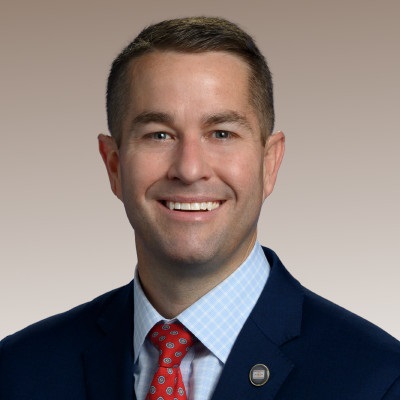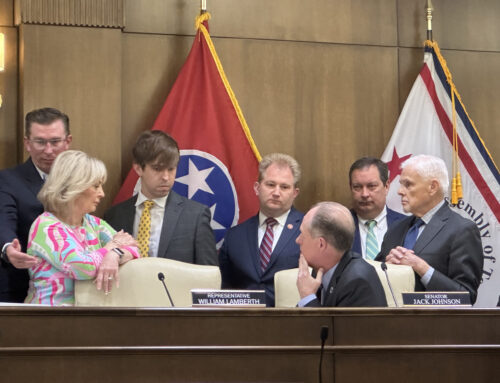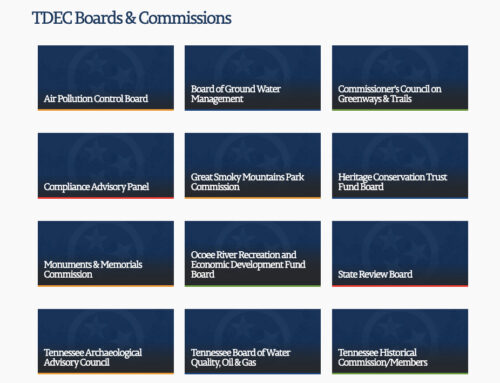The House Public Service Subcommittee passed a bill last week that would permit hundreds of local utility boards that govern rates for electric, water, gas and other public services to stop meeting in person if they choose.
The bill, HB 509, will be heard next week by the House State Government Committee at its 1:30 p.m. meeting Tuesday in the Cordell Hull building in Nashville. The bill has the potential to open the door for local governing bodies to start conducting meetings all electronically and casting votes on key issues by phone outside the public eye.
Sponsor Clark Boyd, R-Lebanon, told the committee that the intention is to allow a member of a utility board who was in quarantine or couldn’t make a meeting in person to attend a meeting electronically.
But the bill allows much more than that.
It has no limits on when or why a member of a governing body could patch into a meeting by phone. And when the entire body decides they need to meet by phone remotely, the bill as amended has no requirements allowing the public to also attend by phone remotely.
For example, one scenario permitted under the proposed legislation is for a utility board to hold a telephone conference call as long as they provide real-time access to that phone call to the public.
Real-time access does not mean the public can call in or patch into a Zoom video call

State Rep. Clark Boyd is sponsoring a bill to allow hundreds of local utility boards to meet electronically.
However, real-time access does not require the utility board to provide a phone number for members of the public to call. It could mean providing a speakerphone at a government location where the public would have to go to listen.
The bill seeks to provide some assurance in that it would require a roll call vote of members of the governing body meeting by phone so at least the public could know who voted how.
But state Rep. Darren Jernigan, D-Nashville, questioned one of the bill’s supporters during the subcommittee meeting about the definition of a roll call vote. He noted that the Nashville Metro Council has conducted voice votes during the pandemic for electronic meetings and has determined such votes are roll call votes by stating that if a member did not ask to be recorded as a “no” they were recorded as a “yes.”
“You’re not going to know how your person voted,” Jernigan said of a voice vote. “If you are at the meeting, you can walk up and ask them.” (During the pandemic, a governor’s executive order has suspended state law to allow electronic meetings of governing bodies.)
Jeremy Elrod, the lobbyist for the Tennessee Municipal Electric Power Association, replied that his definition of a roll call vote would be that each member announces how they vote. But Elrod acknowledged other definitions are being used for a roll call vote.
Supporter says he hopes boards will use new authority ‘lightly’
State Rep. Rebecca Alexander, R-Jonesborough, sought to clarify a portion of the bill that allowed board members to patch in by phone as long as a quorum was present physically at the location of the meeting.
“Only one or two could be virtual?” she asked.
Elrod said that “it is our hope that this is used lightly.” He noted that it’s possible that an entire board could meet electronically without a physical quorum, but if they did so, they had to file a letter with the Secretary of State’s office and would be listed in a report delivered to the General Assembly each year.
Boyd told the subcommittee that the legislation would increase transparency because if a utility board met all electronically, the public would be to “see the all-remote meeting.”
However, the bill does not require that a utility board provide a meeting in which the public can see the governing body, such as through the popular Zoom conference calls. The bill allows either phone-only meetings or video meetings. And it does not require that members of the public be allowed to remotely access those meetings by phone or video from their homes, only that the public has “real-time, live audio or video access,” which could be provided at a government location.
The bill also allows the utility board to comply with any public comment or public hearing period by accepting written comments and reading them into the record instead of requiring that members of the public be allowed to address the board in person. The bill says: “A utility governing body meeting virtually shall maintain any local requirements for public comment during meetings. Compliance with such requirements may be met by allowing timely and appropriately submitted written public comments to be read into the record by a member or staff of the utility governing body during the meeting.”
Background on the bill and Section 108
The bill seeks to graft hundreds of local utility boards into T.C.A. §8-44-108, a statute that originated in 1990 to allow members of state boards and commissions to patch into meetings electronically, such as by phone, or to hold meetings entirely by phone if a need for timely action was necessary and the board could not get together in person.
The idea was that members of state boards are composed of people living across the state and some might have difficultly driving several hours to a central location, especially for a special-called meeting on an emergency issue, preventing the ability to have a quorum to conduct business.
This part of the code has been changed through the years but has only once been changed to give a local governing body the same permissions. That was in 2005 when the small town of Belle Meade asked for some relief. At the time the city had three city commissioners and one would go to his lake house in Michigan each summer, leaving the commission without enough members to conduct business.
Belle Meade’s city manager told TCOG this week that the city used the exception in Section 108 a few times but then expanded its board to five commissioners and no longer had the problem. In fact, because the exception was written for Belle Meade’s commission of three members, this part of the statute no longer applies to the city.
Another part of the law, not in Section 108, allows local school boards to participate in meetings electronically, but only if a physical quorum is present at a location where the public can attend, and only if the member participating electronically is having a family emergency, is out of town for work or is called into military service. The person attending electronically has to be visible by the chair, and can only attend a meeting electronically twice a year.
HB509 is different. It would permit utility boards to have two types of meetings with no limits, just like state boards:
- A hybrid meeting in which almost half of the members would be allowed to patch in by phone or video. None of the members would be required to state a reason for doing so, and, in fact, would not be required to have any reason for attending electronically and not in person.
- A fully electronic meeting in which all members could meet by phone or video. In this case, the governing body in such an electronic meeting would have to determine there is a necessity to meet electronically and then send a letter to the Secretary of State saying why they did so.
Some statement of necessity letters have been vague
State boards and commissions have been filing “determination of necessity” letters for years, but a review by TCOG revealed that many are vague.
You can see the “determination of necessity” reports on the Secretary of State’s website. In 2019, before the pandemic, there were 79 determinations of necessity by state boards.
The Secretary of State also provided the letters sent to the office in 2019 by the governing boards. Some governing bodies explained the reasons behind needing to meet electronically. Others did not. You can view the letters from 2019 here.
The East Tennessee State University board of trustees, for example, used an all-electronic meeting in 2019 “to review and approve tuition and fees, budget proposals for 2019-20, and the 2020-21 capital projects.” It noted that “(t)he prompt necessity of the board’s meeting did not provide adequate time for the membership to make necessary arrangements to be physically present for a quorum” and further explained that the meeting was held out of sequence due to the inauguration of Gov. Bill Lee.
The Standards Committee of the Committee on Pediatric Emergency Care used an all-electronic meeting “to consider and approve rule recommendations” and stated it needed to do so because the full committee was meeting soon and the standards committee needed to finalize its recommendations in advance of the full committee meeting.
Other letters were not as specific and simply stated that the state board had a need to meet electronically and did so.
For example, the Advisory Task Force on Composition of Judicial Districts, which met remotely by conference call 15 times in 2019, simply said in its many letters: “In accordance with T.C.A. 8-44-108 this constitutes the Task Force’s notice of the occurrence of the meeting and the Statement of Necessity,” without explaining any reason.
HB509 would allow utility boards to follow the same statute for all-electronic meetings, having little if any bar for proving why they needed to meet entirely by conference call.
HB509 would create one different standard from what is allowed for state boards. Members of state boards who attend electronically are not allowed to receive a per diem. But HB509 specifically states that members of utility boards meeting electronically can continue to receive their meeting per diem or compensation.




